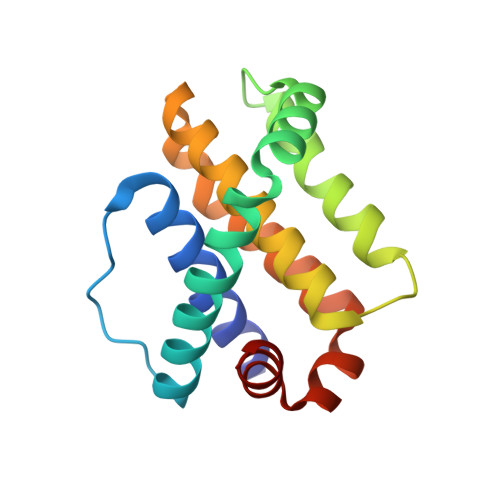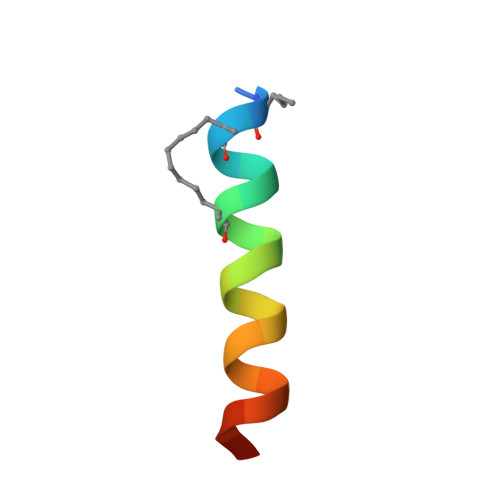Iterative optimization yields Mcl-1-targeting stapled peptides with selective cytotoxicity to Mcl-1-dependent cancer cells.
Rezaei Araghi, R., Bird, G.H., Ryan, J.A., Jenson, J.M., Godes, M., Pritz, J.R., Grant, R.A., Letai, A., Walensky, L.D., Keating, A.E.(2018) Proc Natl Acad Sci U S A 115: E886-E895
- PubMed: 29339518
- DOI: https://doi.org/10.1073/pnas.1712952115
- Primary Citation of Related Structures:
5W89, 5W8F - PubMed Abstract:
Bcl-2 family proteins regulate apoptosis, and aberrant interactions of overexpressed antiapoptotic family members such as Mcl-1 promote cell transformation, cancer survival, and resistance to chemotherapy. Discovering potent and selective Mcl-1 inhibitors that can relieve apoptotic blockades is thus a high priority for cancer research. An attractive strategy for disabling Mcl-1 involves using designer peptides to competitively engage its binding groove, mimicking the structural mechanism of action of native sensitizer BH3-only proteins. We transformed Mcl-1-binding peptides into α-helical, cell-penetrating constructs that are selectively cytotoxic to Mcl-1-dependent cancer cells. Critical to the design of effective inhibitors was our introduction of an all-hydrocarbon cross-link or "staple" that stabilizes α-helical structure, increases target binding affinity, and independently confers binding specificity for Mcl-1 over related Bcl-2 family paralogs. Two crystal structures of complexes at 1.4 Å and 1.9 Å resolution demonstrate how the hydrophobic staple induces an unanticipated structural rearrangement in Mcl-1 upon binding. Systematic sampling of staple location and iterative optimization of peptide sequence in accordance with established design principles provided peptides that target intracellular Mcl-1. This work provides proof of concept for the development of potent, selective, and cell-permeable stapled peptides for therapeutic targeting of Mcl-1 in cancer, applying a design and validation workflow applicable to a host of challenging biomedical targets.
Organizational Affiliation:
Department of Biology, Massachusetts Institute of Technology, Cambridge, MA 02139.


















